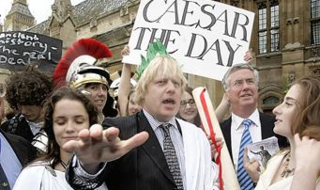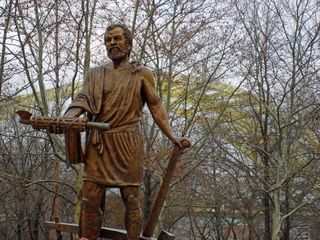Be careful with the Classics
Whenever Boris Johnson gets in the news, it's a prompt for the classical parallels to come flooding out -- and a warning about how misleading they can be. Boris's rather histrionic decision to back the Out campaign and so desert David Cameron (with whatever aims at replacing him . . .) has elicited quite a few 'Et tu, Brute's, Shakespeare's last words of Julius Caesar, as he fell murdered by his one time friend and colleague Marcus Junius Brutus on the Ides of March 44 BC -- the ultimate case of disloyalty.
Classicists are forever pointing out that "Et tu Brute" were not actually what the ancients said that Caesar said as he died. The best bet is that he said to Brutus (in Greek) 'kai su teknon?' or 'and you my child?', fuelling the suspicion that Brutus was actually Caesar's illegitimate son ('teknon' could be literally 'son' or a more general term of affection for a younger man). But what is less often pointed out is that the assassination was a rather inglorious failure, and not a successful coup at all. It wasn't just, as Shakespeare had it, that Brutus and his colleagues were shortly defeated by the supporters of the murdered leader (so watch your back, Boris). It was also that there whole political programme proved futile. They set out to destroy not just the tyrant, but also tyranny, in the name of Libery. The actual result of the assassination, after more than a decade of civil war, was autocracy (aka tyranny) established on a permanent basis under the emperor Augustus.
So 'et tu Brute' isnt quite as apt as it is often assumed to be.
Something similar is true with the Cincinnatus parallel that Boris himself drew a few years ago, and has been repeated this last week: "If, like the Roman leader Cincinnatus, I were to be called from my plough to serve in that office , I wouldn't, of course, say no."
Cincinnatus was a 'hero' of early Rome, and best known for being called from his farm (and his plough) to take charge of the city when they were in dire straits fighting against their neighbours, the Aequi. And he was so honourable that once he had won the war, rather than continuing in power, he just returned to the plough. (That's his statue at his name city of Cincinnati, above).
That's the nice bit. What's less often remembered is that Cincinnatus was one of the most virulent haters of the lower orders (the "plebeians" of A Mitchell fame), one of the most enthusiastic defenders of the privileges of the patricians -- and the keenest to keep the plebs out.
Now I dont think that was quite what Boris meant, but just possibly there is more truth in the comparison than he intended.
(Photo above by Jeff Moore)
Mary Beard's Blog
- Mary Beard's profile
- 4110 followers





